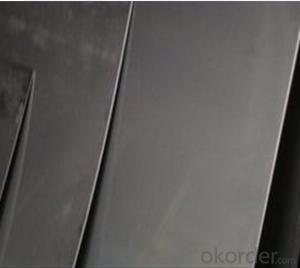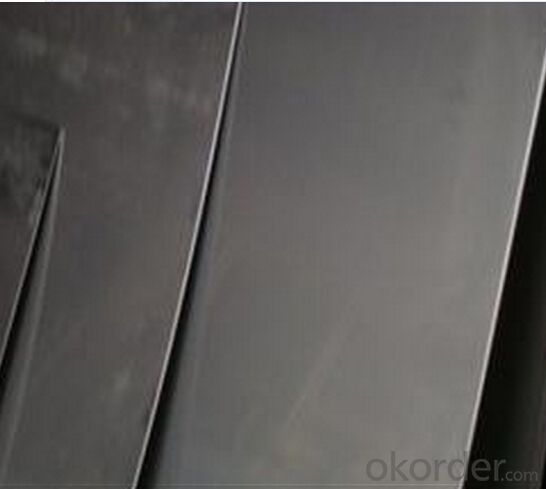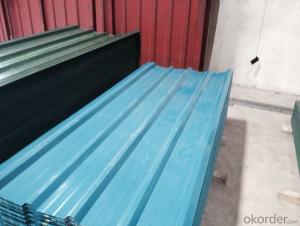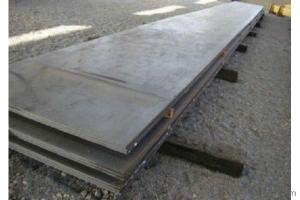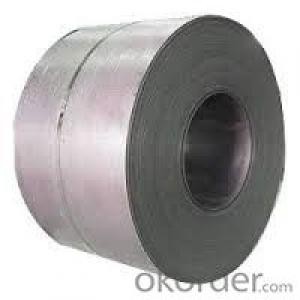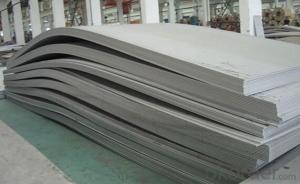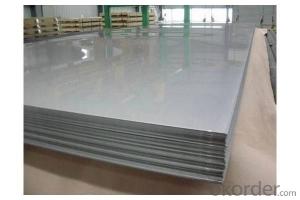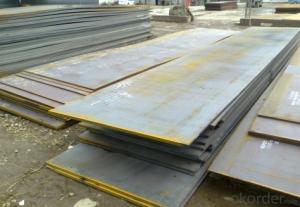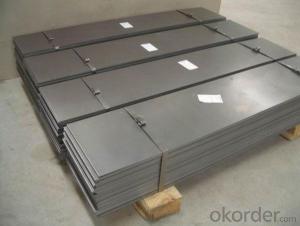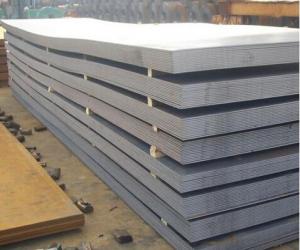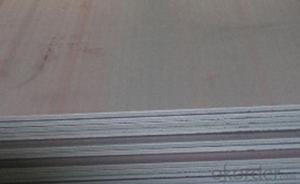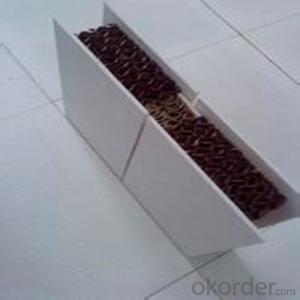Hot Rolled Carbon Steel Sheet Panel ASTM A36 ASTM A570
- Loading Port:
- Tianjin
- Payment Terms:
- TT OR LC
- Min Order Qty:
- 50 m.t.
- Supply Capability:
- 50000 m.t./month
OKorder Service Pledge
OKorder Financial Service
You Might Also Like
Specification
1.Description of steel sheet:
Stainless steel types 304 and 304L.Type 304 stainless steel material is a kind of common stainless steel materials, corrosion prevention is b
2.Features of steel sheet:
304 stainless steel has good corrosion and corrosion resistance and good resistance to intergranular corrosion. For oxidizing acid, obtained in the experiment, the concentration of 65% or less under the boiling temperature of nitric acid, 304stainless steel has a strong corrosion resistance. To most organic and inorganic acid and alkali solution with good corrosion resistance ability.
All stainless stock can be delivered mirror polished if required
3.Data of steel sheet:
(In Quenching and Tempering)
Tensile strength | Yield strength | Elongation | Reduction in Area | Impact | Hardness |
(σb/MPa) | (σs/MPa) | (δ5/%) | (ψ/%) | (J) | (HRC) |
≥185 | 370-500 | ≥21 |
4.Image of steel sheet:
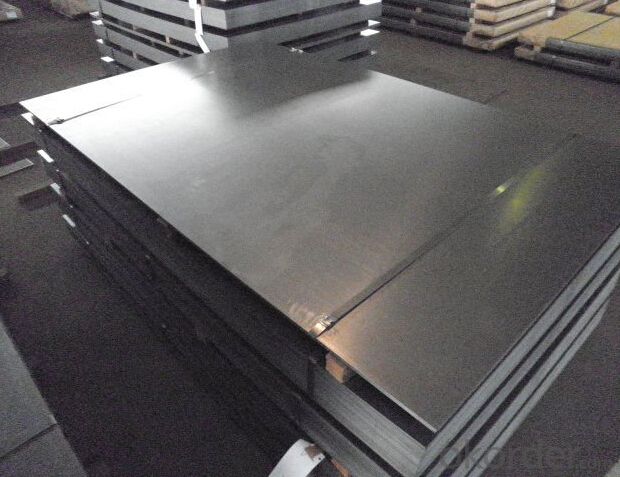
5.FAQ
We have organized several common questions for our clients,may help you sincerely:
①How about your Warranty?
Warranty: 1-Year for the whole light. Warranty is based on correct storage, installation, using and maintenanc
②How to guarantee the quality of the products?
We have established the international advanced quality management system,every link from raw material to final product we have strict quality test;We resolutely put an end to unqualified products flowing into the market. At the same time, we will provide necessary follow-up service assurance.
③How long can we receive the product after purchase?
In the purchase of product within three working days, We will arrange the factory delivery as soon as possible. The pecific time of receiving is related to the state and position of customers.Commonly 7 to 10 working days can be served.
- Q: What is the difference between the zinc plated color guide and the profiled steel sheet?
- Profiled steel sheet Yaxing, GangBan, English Name: profiled steel sheetRoof and wall panels are usually 0.4 to 1.6 millimeters thick and used for load-bearing slabs or silos with a thickness of 2~3 millimeters or more. The wave height generally ranges from 10~200 mm. When not reinforced, the ratio of height to thickness should be controlled within 200. When the long roof panel, the slope can be used from 2 to 5%, while the deflection is less than l/300 (L for the calculation of span length). At present, part of the waveform used in the construction is shown in Figure II, commonly used for profiled steel sheets.Because the original plate is very thin, the quality of the anticorrosive coating directly affects the service life of the profiled steel sheet. In order to meet the requirements of processing and rust prevention, the coated steel plate shall be examined in accordance with the relevant provisions. Under normal circumstances, thin steel plate can also be used according to the requirements, after pressing type, and then coated with anti rust paint, or use stainless steel sheet, the original plate.
- Q: Can steel sheets be drilled?
- Yes, steel sheets can be drilled.
- Q: Are steel sheets resistant to UV radiation?
- No, steel sheets are not resistant to UV radiation.
- Q: What is the difference between zinc-coated and zinc-aluminum coated steel sheets?
- Zinc-coated and zinc-aluminum coated steel sheets are two types of steel that have undergone zinc treatment for protection. However, there are differences between the two processes that result in varying characteristics and performance. Galvanized steel sheets, also known as zinc-coated steel sheets, are made by immersing the steel sheets in molten zinc. This creates a layer of pure zinc on the steel's surface, forming a barrier against corrosion. The zinc layer is typically evenly applied across the entire sheet. On the other hand, galvalume or Aluzinc steel sheets, which are zinc-aluminum coated, are created by coating the steel sheets with a mixture of zinc and aluminum. This coating is applied using a hot-dip process, similar to the one used for zinc-coated steel sheets. The aluminum in the coating enhances corrosion resistance compared to pure zinc coatings. The main difference between zinc-coated and zinc-aluminum coated steel sheets lies in their performance and durability. Zinc-coated sheets effectively protect against corrosion in most atmospheric environments. However, in more aggressive or severe environments, such as high humidity or exposure to saltwater, zinc-coated steel may not provide sufficient protection and can corrode over time. In contrast, zinc-aluminum coated steel sheets offer superior corrosion resistance due to the presence of aluminum in the coating. The aluminum acts as a sacrificial anode, corroding preferentially to the steel and safeguarding it from corrosion. This makes zinc-aluminum coated sheets more suitable for environments with significant corrosion concerns, such as coastal areas or industrial settings. In conclusion, while both zinc-coated and zinc-aluminum coated steel sheets provide a protective zinc layer, zinc-aluminum coated sheets offer improved corrosion resistance due to the inclusion of aluminum. Therefore, zinc-aluminum coated steel sheets are generally preferred in aggressive or corrosive environments, while zinc-coated steel sheets are suitable for most atmospheric conditions.
- Q: What is the process of applying fire-resistant coatings to steel sheets?
- The process of applying fire-resistant coatings to steel sheets usually involves cleaning and preparing the surface of the steel sheets to ensure optimal adhesion. Then, a fire-resistant coating is applied using techniques such as spraying, rolling, or brushing. The coating is left to dry or cure, depending on the specific product, and may require multiple coats for desired protection. The coated steel sheets are then ready to be used in applications where fire resistance is required.
- Q: Are the steel sheets resistant to atmospheric corrosion?
- Yes, steel sheets are typically resistant to atmospheric corrosion due to their protective oxide layer which acts as a barrier against rust and other forms of corrosion caused by exposure to air and moisture.
- Q: Are steel sheets suitable for wastewater treatment facilities?
- Yes, steel sheets are suitable for wastewater treatment facilities. Steel is a highly durable and corrosion-resistant material, making it suitable for withstanding the harsh and corrosive environment found in wastewater treatment facilities. Additionally, steel sheets can be easily fabricated and installed, providing flexibility in design and construction.
- Q: Are steel sheets suitable for outdoor signage?
- Yes, steel sheets are suitable for outdoor signage. Steel is a durable and weather-resistant material that can withstand harsh outdoor conditions, such as rain, wind, and sunlight. It is also sturdy enough to support the weight of signage and can be easily fabricated into various shapes and sizes. Additionally, steel sheets can be painted or coated to enhance their appearance and protect against corrosion, making them a popular choice for outdoor signage.
- Q: Can the steel sheets be used for skylights or roof windows?
- Certainly, skylights or roof windows can make use of steel sheets. Steel, being a resilient and robust substance, is capable of enduring diverse weather circumstances, thus rendering it appropriate for such purposes. Moreover, steel sheets may be crafted and tailored to satisfy the particular specifications of skylights or roof windows. By installing them, one can avail oneself of both natural light and ventilation while simultaneously upholding the building's structural integrity. However, it is vital to guarantee adequate insulation and glazing in order to avert any heat loss or gain and to maximize energy efficiency.
- Q: Are steel sheets suitable for water tanks or reservoirs?
- Yes, steel sheets are suitable for water tanks or reservoirs. Steel is a durable and strong material that can withstand the weight of water and does not easily corrode or leak. It is commonly used in the construction of water tanks and reservoirs due to its reliability and longevity.
Send your message to us
Hot Rolled Carbon Steel Sheet Panel ASTM A36 ASTM A570
- Loading Port:
- Tianjin
- Payment Terms:
- TT OR LC
- Min Order Qty:
- 50 m.t.
- Supply Capability:
- 50000 m.t./month
OKorder Service Pledge
OKorder Financial Service
Similar products
Hot products
Hot Searches
Related keywords
